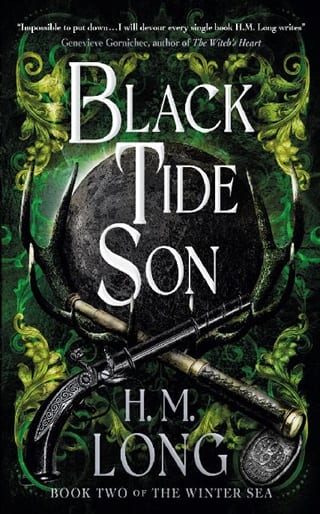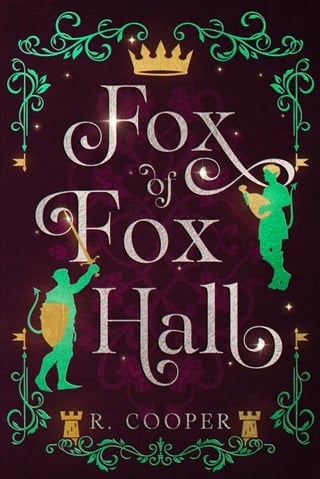Four Hesten, Usti Chain
FOUR
Hesten, Usti Chain
Ten Months Ago
SAMUEL
I tasted ash and smoke on the breeze, calling up memories and emotions that tugged my mind away from Hesten's busy streets.
Hesten's inhabitants were lively and loud under the summer sun, at the climax of the Sweet Moons. Ladies in cotton gowns with loosely veiled hair ambled by on fine mounts, old men fanned themselves with their hats in the shade and an innkeeper rolled a barrel from an archway to the common catacombs, where great slabs of winter-harvested ice kept ale and perishables fresh through the warm months. I glimpsed clothing and faces from every nation and heard a myriad of languages united under the pristine blue sky.
But the smell of smoke lingered. I squinted from under the brim of my hat to the flat-fronted, gilded buildings overhead, guided by a dreamer's rootless certainty.
I saw it: a great, charred space between rooflines. The gap was so large, so obvious, my eyes had slipped over it entirely.
My destination was gone. My shock was sudden and visceral, edged with panic. In my pocket, I clutched my coin and fought to keep my expression calm.
Still, a nearby man noticed my dismay. He had the long eyes of the Ismani, his embroidered cap at odds with the light Usti kaftan he wore. When he spoke, his Usti was unaccented.
"There was a fire, night before last." The man nodded over his pipe, languid smoke seeping from between his lips. He sat on a low windowsill, a cup of tea at his knee. "A pity. Maren was the best jeweler in this port. Very bad luck."
My stomach dropped. "Maren, the Mereish jeweler? The charm maker?"
The Ismani man tilted his head to one side, not accusatory but curious. "Yes. You are Aead?"
I gave him a smile that would have been more genuine had my skin not been crawling. "I fear you are mistaken. Pardon me."
I moved north along the canal until I sensed the Ismani no longer watching me then cut over towards the burned buildings. The crowd kept well back, though no guards enforced the boundary. The locals simply went about their business, casting me glances as I separated from the throng, stepped onto ashy cobbles—the tread of my boots oddly muffled—and approached the rubble.
Charred, skeletal timbers reached their fingers into the breach. Heat still radiated from the piles of rubble beneath and sun glinted off melted glass. Smoke eddied, thin and eerie, and the scent of burning became overpowering. Only the canals and a few stone walls had saved the entire area from destruction.
I stared at the ruin. Not long ago, families had lived here. I remembered the smell of spices and cooking food, and a Mereish jeweler who had plied me with coffee and given me three immeasurable gifts—an ensorcelled talisman, a book, and hope. Then, after our return from beyond the Stormwall, he had given me one more.
A promise.
Sadness warred with unease in my chest. Buildings burned. It happened. But…
I came a little closer to the rubble, half searching for any sign of… what? Ill intent? A body? Surely any remains would have already been salvaged.
"What are you doing? You should not be here."
I looked up to see a woman standing in the mouth of an alleyway, out of sight of the square. She wore a long, embroidered coat and no padding beneath her skirts, giving her a smooth silhouette in the Mereish style. Her hair was blonde and her skin just touched with a northern brown, freckled across the cheeks—pretty, but not distractingly so. Indeed, other than the freckles and her pale hair, there was nothing noteworthy about her. Even her age was hard to discern. A jaded twenty? A youthful thirty?
"I apologize for any intrusion. I knew a man who lived here. The jeweler, Maren." I gestured to the rubble. "Is he alive?"
The woman eyed me, sticking to the shadows of the alley. "No," she replied. Her Mereish accent—soft, gentling consonants and blurring vowels—became stronger. "Three died, including Maren."
I let out a long breath. "My deepest condolences," I said. I should not linger, not when there were people in this city—including this woman, it seemed—who had much more right to grieve than I. Besides, if Maren was gone, I needed to find a quiet place to think and come up with a new plan.
I turned to leave, touching my hat and offering what I hoped was a sympathetic look.
"Why were you looking for him?" she asked before I could step away.
"I hoped for his expertise," I hedged. I had no intention of telling this stranger the truth—that I was a broken mage looking for a cure, and Maren had been helping me.
The woman kept talking: "Well, it would be best if you forget Mr. Maren." She nodded over her shoulder, down the alley. At first all I saw was char on the brick wall, then I noticed the letters that had also been smeared there.
Against my better judgement, I stepped closer. The woman moved aside and I craned to see down the alley.
A Mereish word was painted on the pale red brick in soot and something thicker—my dreamer's sense, coiling, warned it was blood.
"It translates best to ‘oathbreaker,'" the woman said, standing just two paces from me now. "But it means much more. It means to break the trust of kin. Of blood. It means to break faith and tradition. It means final, irrevocable exile. Maren was a traitor to my people, and they do not forgive such things lightly. If you knew Maren, it is best to pretend you did not."
The bitter taste of smoke was thick on my tongue now. Maren had shared Mereish secrets with me. He had promised to help me track down a Mereish healer-mage and find a cure for Ben's and my corruption.
Had that kindness—had I—contributed to his death?
The woman watched me, her eyes softened with sadness, but there was a shadow beneath them that made my fingers twitch towards the buttons of my jacket and the pistol beneath.
"I knew him very little, regardless," I told her, slipping my fingers through the buttons of my coat to rest them over my stomach, as any gentleman might. "I will intrude no longer. Again, my deepest condolences."
I hastened back to the crowd, the street and ship where Mary, I prayed, was still safe. But I glanced back as I reached the square. The woman had turned to stare at the rubble, the wind blowing the ends of her fringe into her eyes.
She did not look at me again.
 Fullepub
Fullepub 



